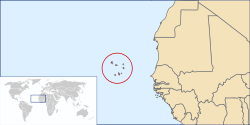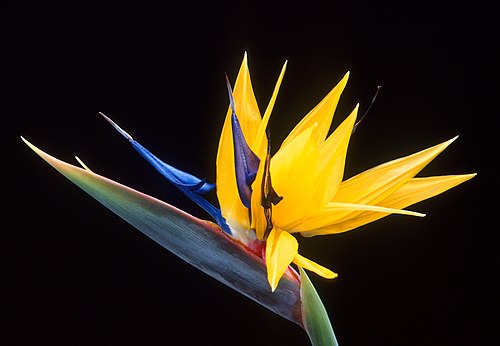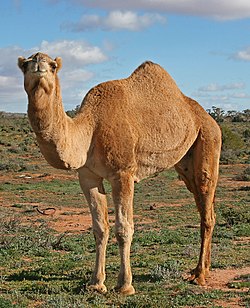Portal:Africa



Africa is the world's second-largest and second-most populous continent after Asia. At about 30.3 million km2 (11.7 million square miles) including adjacent islands, it covers 20% of Earth's land area and 6% of its total surface area. With nearly 1.4 billion people as of 2021, it accounts for about 18% of the world's human population. Africa's population is the youngest among all the continents; the median age in 2012 was 19.7, when the worldwide median age was 30.4. Based on 2024 projections, Africa's population will exceed 3.8 billion people by 2100. Africa is the least wealthy inhabited continent per capita and second-least wealthy by total wealth, ahead of Oceania. Scholars have attributed this to different factors including geography, climate, corruption, colonialism, the Cold War, and neocolonialism. Despite this low concentration of wealth, recent economic expansion and a large and young population make Africa an important economic market in the broader global context, and Africa has a large quantity of natural resources.
Africa is highly biodiverse; it is the continent with the largest number of megafauna species, as it was least affected by the extinction of the Pleistocene megafauna. However, Africa is also heavily affected by a wide range of environmental issues, including desertification, deforestation, water scarcity, and pollution. These entrenched environmental concerns are expected to worsen as climate change impacts Africa. The UN Intergovernmental Panel on Climate Change has identified Africa as the continent most vulnerable to climate change.
The history of Africa is long, complex, and varied, and has often been under-appreciated by the global historical community. In African societies the oral word is revered, and they have generally recorded their history via oral tradition, which has led anthropologists to term them "oral civilisations", contrasted with "literate civilisations" which pride the written word. African culture is rich and diverse both within and between the continent's regions, encompassing art, cuisine, music and dance, religion, and dress.
Africa, particularly Eastern Africa, is widely accepted to be the place of origin of humans and the Hominidae clade, also known as the great apes. The earliest hominids and their ancestors have been dated to around 7 million years ago, and Homo sapiens (modern human) are believed to have originated in Africa 350,000 to 260,000 years ago. In the 4th and 3rd millennia BCE Ancient Egypt, Kerma, Punt, and the Tichitt Tradition emerged in North, East and West Africa, while from 3000 BCE to 500 CE the Bantu expansion swept from modern-day Cameroon through Central, East, and Southern Africa, displacing or absorbing groups such as the Khoisan and Pygmies. Some African empires include Wagadu, Mali, Songhai, Sokoto, Ife, Benin, Asante, the Fatimids, Almoravids, Almohads, Ayyubids, Mamluks, Kongo, Mwene Muji, Luba, Lunda, Kitara, Aksum, Ethiopia, Adal, Ajuran, Kilwa, Sakalava, Imerina, Maravi, Mutapa, Rozvi, Mthwakazi, and Zulu. Despite the predominance of states, many societies were heterarchical and stateless. Slave trades created various diasporas, especially in the Americas. From the late 19th century to early 20th century, driven by the Second Industrial Revolution, most of Africa was rapidly conquered and colonised by European nations, save for Ethiopia and Liberia. European rule had significant impacts on Africa's societies, and colonies were maintained for the purpose of economic exploitation and extraction of natural resources. Most present states emerged from a process of decolonisation following World War II, and established the Organisation of African Unity in 1963, the predecessor to the African Union. The nascent countries decided to keep their colonial borders, with traditional power structures used in governance to varying degrees. (Full article...)
Selected article –
The Adar oilfield, also known as the Adar Yale, Adar Yeil or Adaril field, is an oilfield situated in the Melut in South Sudan estimated to contain about 276 million barrels (43,900,000 m3) of oil. The Chevron Corporation discovered the Adar Yale field in 1981, shortly before the start of the Second Sudanese Civil War (1983–2005). Soon after Chevron had suspended operations in 1984, Sudanese government troops began attacking civilian settlements in the area, burning the houses and driving the people away, and in the late 1990s, Nuer militias from Nasir helped the army in clearing away the people to make way for the roads and infrastructure of the oilfield.
President Omar al-Bashir inaugurated the site in March 1997, and it initially produced just 5,000 barrels (790 m3) a day. Production from this oilfield, which lies close to the borders with Sudan and Ethiopia, has the potential to bring significant economic benefits to the region. However, until recently the focus has been on clearing the population away from the oilfield rather than on a longer term strategy for developing the region. China has provided a large investment in the Adar oilfield and others in South Sudan and Sudan and has made plans to make extensive further investments. (Full article...)
Featured pictures –
Did you know (auto-generated) -

- ... that African-American journalist Erna P. Harris was called a "fearless critic" of the internment of Japanese Americans by the US government during World War II?
- ... that a lack of screening for pregnant women with syphilis in sub-Saharan Africa is associated with increased infant mortality?
- ... that during the First World War the East African Mounted Rifles sometimes painted stripes on their horses to camouflage them as zebras?
- ... that Dahiru Musdapher, the 12th chief justice of Nigeria, was once a BBC World Service contributor for West Africa and Hausa?
- ... that Togo's abortion law was one of the first in Africa to allow abortion in the case of rape?
- ... that Olive MacLeod journeyed 6,000 km (3,700 mi) through Africa in 1910–1911 to visit her murdered fiancé's grave, and wrote a book based on her observations?
Categories
Selected biography –
Juba II of Mauretania (Latin: Gaius Iulius Iuba; Ancient Greek: Ἰóβας, Ἰóβα or Ἰούβας; c. 48 BC – AD 23) was the son of Juba I and client king of Numidia (30–25 BC) and Mauretania (25 BC – AD 23). Aside from his very successful reign, he was a highly respected scholar and author. His first wife was Cleopatra Selene II, daughter of Queen Cleopatra VII of Ptolemaic Egypt and Roman Triumvir Mark Antony. (Full article...)
Selected country –
 |
 |
|

| ||
Cape Verde, officially the Republic of Cape Verde (Portuguese: Cabo Verde, Portuguese pronunciation: [ˈkabu ˈveɾdɨ]), is a republic located on an archipelago in the Macaronesia ecoregion of the North Atlantic Ocean, off the western coast of Africa. The previously uninhabited islands were discovered and colonized by the Portuguese in the fifteenth century. The country is named after Cap Vert (meaning Green Cape) in Senegal, the westernmost point of continental Africa. It achieved independence from Portugal in 1975 after a long armed struggle in the jungles of Guinea-Bissau.
The politics of Cape Verde takes place in a framework of a parliamentary representative democratic republic, whereby the Prime Minister of Cape Verde is the head of government, and of a multi-party system. Executive power is held by the government. Legislative power is vested in both the government and the National Assembly. The Judiciary is independent of the executive and the legislature. (Read more...)
Selected city –
Cape Coast is a city and the capital of the Cape Coast Metropolitan District and the Central Region of Ghana. It is located about 38.4 mi (61.8 km) from Sekondi-Takoradi and approximately 80 mi (130 km) from Accra. The city is one of the most historically significant settlements in Ghana. As of the 2010 census, Cape Coast has a population of 108,374 people. The majority of people who lived in the city are Fante.
The city was once the capital of the Fetu Kingdom, an aboriginal Guan kingdom located 10 miles (16 km) north of Cape Coast. Once the Europeans arrived, they established the Cape Coast Castle, which eventually went under the hands of the British who named the castle and its surrounding settlement the headquarters of the Royal African Company. Cape Coast became the capital of the Gold Coast from 1821 until 1877, where it was transferred to Accra. (Full article...)
In the news
- 10 April 2025 – Land reform in Zimbabwe
- Zimbabwe begins issuing the first financial compensation payments to White Zimbabwean farmers whose farms were seized by Robert Mugabe's government between 2000 and 2002. A total of 740 farmers will be compensated as per the 2020 agreement with the Commercial Farmers' Union. (BBC News)
- 8 April 2025 –
- The death toll from the heavy flooding in Kinshasa, Democratic Republic of the Congo, caused by overflow of the Ndjili River increases to 33 deaths. Hundreds of buildings are completely submerged and thousands of people are trapped in their homes. (NPR) (DW)
- About 50 hippos are killed by anthrax poisoning at Virunga National Park in the Democratic Republic of the Congo. (CTV News)
- 8 April 2025 – 2024 Democratic Republic of the Congo coup attempt, Democratic Republic of the Congo–United States relations
- Three U.S. citizens have their sentences for attempting a coup against the Congolese President Félix Tshisekedi in 2024 commuted and are extradited back to the United States. They were previously sentenced to death along with 34 others for the failed attempt that killed six people, including the coup's leader Christian Malanga. (NPR)
- 7 April 2025 – Herder–farmer conflicts in Nigeria
- The National Emergency Management Agency reports that at least 52 people have been killed and over 2,000 others have been displaced from their homes in recent days in tit for tat attacks by rival herders over control of arable land in Plateau State, Nigeria. (Reuters)
- 7 April 2025 – Algeria–Mali relations
- Algeria bans flights to and from Mali in response to "recurrent violations" of Algerian airspace by Malian military drones. (Reuters)
Updated: 17:05, 12 April 2025
General images -
Africa topics
More did you know –
- ...that Iyabo Obasanjo-Bello, a Nigerian Senator from the People's Democratic Party, is the daughter of former President Olusegun Obasanjo?
- ...that the 2007 South Africa miners' strike, which impacted over 240,000 workers, was the first ever industry-wide miners' strike in the history of South Africa?
- ...that Seleh Leha, a town in Tigray Region in northern Ethiopia, was the site of a leprosarium built during the Italian occupation of East Africa and abandoned in 1941?
- ...that Sarir field, an oil field in Cyrenaica operated by the Arabian Gulf Oil Company (AGOCO), is considered to be the largest in Libya, with estimated oil reserves of 12 Gbbl (1.9×109 m3)?
Related portals
Major Religions in Africa
North Africa
West Africa
Central Africa
East Africa
Southern Africa
Associated Wikimedia
The following Wikimedia Foundation sister projects provide more on this subject:
-
Commons
Free media repository -
Wikibooks
Free textbooks and manuals -
Wikidata
Free knowledge base -
Wikinews
Free-content news -
Wikiquote
Collection of quotations -
Wikisource
Free-content library -
Wikispecies
Directory of species -
Wikiversity
Free learning tools -
Wikivoyage
Free travel guide -
Wiktionary
Dictionary and thesaurus




























































































